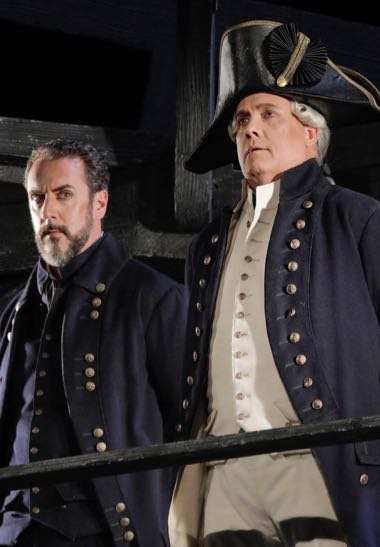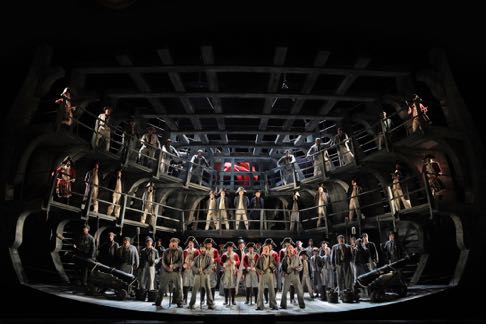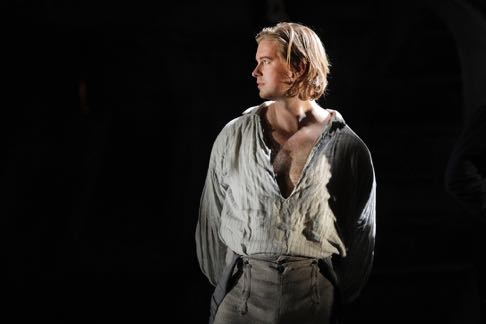Recently in Reviews
English Touring Opera are delighted to announce a season of lyric monodramas to tour nationally from October to December. The season features music for solo singer and piano by Argento, Britten, Tippett and Shostakovich with a bold and inventive approach to making opera during social distancing.
This tenth of ten Live from London concerts was in fact a recorded live performance from California. It was no less enjoyable for that, and it was also uplifting to learn that this wasn’t in fact the ‘last’ LfL event that we will be able to enjoy, courtesy of VOCES8 and their fellow vocal ensembles (more below …).
Ever since Wigmore Hall announced their superb series of autumn concerts, all streamed live and available free of charge, I’d been looking forward to this song recital by Ian Bostridge and Imogen Cooper.
The Sixteen continues its exploration of Henry Purcell’s Welcome Songs for Charles II. As with Robert King’s pioneering Purcell series begun over thirty years ago for Hyperion, Harry Christophers is recording two Welcome Songs per disc.
Although Stile Antico’s programme article for their Live from London recital introduced their selection from the many treasures of the English Renaissance in the context of the theological debates and upheavals of the Tudor and Elizabethan years, their performance was more evocative of private chamber music than of public liturgy.
In February this year, Albanian soprano Ermonela Jaho made a highly lauded debut recital at Wigmore Hall - a concert which both celebrated Opera Rara’s 50th anniversary and honoured the career of the Italian soprano Rosina Storchio (1872-1945), the star of verismo who created the title roles in Leoncavallo’s La bohème and Zazà, Mascagni’s Lodoletta and Puccini’s Madama Butterfly.
Evidently, face masks don’t stifle appreciative “Bravo!”s. And, reducing audience numbers doesn’t lower the volume of such acclamations. For, the audience at Wigmore Hall gave soprano Elizabeth Llewellyn and pianist Simon Lepper a greatly deserved warm reception and hearty response following this lunchtime recital of late-Romantic song.
Collapsology. Or, perhaps we should use the French word ‘Collapsologie’ because this is a transdisciplinary idea pretty much advocated by a series of French theorists - and apparently, mostly French theorists. It in essence focuses on the imminent collapse of modern society and all its layers - a series of escalating crises on a global scale: environmental, economic, geopolitical, governmental; the list is extensive.
For this week’s Live from London vocal recital we moved from the home of VOCES8, St Anne and St Agnes in the City of London, to Kings Place, where The Sixteen - who have been associate artists at the venue for some time - presented a programme of music and words bound together by the theme of ‘reflection’.
'Such is your divine Disposation that both you excellently understand, and royally entertaine the Exercise of Musicke.’
Amongst an avalanche of new Mahler recordings appearing at the moment (Das Lied von der Erde seems to be the most favoured, with three) this 1991 Mahler Second from the 2nd Kassel MahlerFest is one of the more interesting releases.
‘And there was war in heaven: Michael and his angels fought against the dragon; and the dragon fought and his angels, And prevailed not; neither was their place found any more in heaven … that old serpent … Satan, which deceiveth the whole world: he was cast out into the earth, and his angels were cast out with him.’
If there is one myth, it seems believed by some people today, that probably needs shattering it is that post-war recordings or performances of Wagner operas were always of exceptional quality. This 1949 Hamburg Tristan und Isolde is one of those recordings - though quite who is to blame for its many problems takes quite some unearthing.
There was never any doubt that the fifth of the twelve Met Stars Live in Concert broadcasts was going to be a palpably intense and vivid event, as well as a musically stunning and theatrically enervating experience.
‘Love’ was the theme for this Live from London performance by Apollo5. Given the complexity and diversity of that human emotion, and Apollo5’s reputation for versatility and diverse repertoire, ranging from Renaissance choral music to jazz, from contemporary classical works to popular song, it was no surprise that their programme spanned 500 years and several musical styles.
The Academy of St Martin in the Fields have titled their autumn series of eight concerts - which are taking place at 5pm and 7.30pm on two Saturdays each month at their home venue in Trafalgar Square, and being filmed for streaming the following Thursday - ‘re:connect’.
The London Symphony Orchestra opened their Autumn 2020 season with a homage to Oliver Knussen, who died at the age of 66 in July 2018. The programme traced a national musical lineage through the twentieth century, from Britten to Knussen, on to Mark-Anthony Turnage, and entwining the LSO and Rattle too.
With the Live from London digital vocal festival entering the second half of the series, the festival’s host, VOCES8, returned to their home at St Annes and St Agnes in the City of London to present a sequence of ‘Choral Dances’ - vocal music inspired by dance, embracing diverse genres from the Renaissance madrigal to swing jazz.
Just a few unison string wriggles from the opening of Mozart’s overture to Le nozze di Figaro are enough to make any opera-lover perch on the edge of their seat, in excited anticipation of the drama in music to come, so there could be no other curtain-raiser for this Gala Concert at the Royal Opera House, the latest instalment from ‘their House’ to ‘our houses’.
"Before the ending of the day, creator of all things, we pray that, with your accustomed mercy, you may watch over us."
Reviews

23 Sep 2019
Billy Budd in San Francisco
San Francisco Opera’s Billy Budd confirms once again that Britten’s reworking of Melville’s novella is among the great masterpieces of the repertory. It boasted an exemplary cast in an exemplary production, and enlightened conducting.
Dutch conductor Lawrence Renes’ seascapes were deeply and powerfully drawn, his battle was monumental, his moral confusion was terrifying, his defeat was shattering. His orchestra was an aggressive, present player in the telling of Melville’s parable. Britten’s score in this conductor’s hands proves that Billy Budd’s story is not at all as simple as it seems and that its lesson is so bleak and huge that it demands the protection of high art to be borne.
The War Memorial Opera House was built before architectural acoustics was a science. Its acoustic can be mushy and quirky. But for this Billy Budd the San Francisco Opera Orchestra somehow clearly projected the beauty of Britten’s moral ideal of handsomeness in a stunning display of colors and volumes and textures. The diction of the opera’s protagonists was crystal clear, every word was fully understandable in the hyper British-like sounds of careful musical diction. It was a remarkable feat.

This was the 2010 production from Glyndebourne by British theater director Michael Grandage and his designer Christopher Oram, seen at the Brooklyn Academy in 2014 to great acclaim. The set is the exaggerated super structure of a British man-of-war called the Indomitable. It is the world of 40 male San Francisco Opera choristers impressed into service as its crew, along with 15 or so more sailers who have names, plus the ship’s captain and his officers and a number of Ship’s Boys.
These 80 inhabitants of the Indomitable populate its globe-shaped world from which no one will escape, not even Billy Budd who, in death, remains alive as the embodiment of a critical enigma of our existence — can good and beauty actually exist in this world? The Grandage production implies that no, it cannot. At the end of the opera the Indomitable’s captain, the now old Starry Vere, the Indomitable’s moral conscience, stands alone on the stage. He continues pondering the enigma as he has since the moment Billy Budd was hung. He looks us straight in the face to tell us that he could have saved Billy Budd but did not. Black out.
Like Peter Grimes and Aschenbach (Death in Venice) the Indomitable’s Captain Vere is a tenor. But here tenor William Burden’s voice is neither heroic nor is it cerebral. Mr. Burden is a fine singer and actor who does not project force of personality. This allows us to perceive Captain Vere as an abstract player in a moral drama, not as an individual man in the throes of crisis. His most telling moment was when he prepared himself to tell Billy that he will be hung. He stood alone in white light, lost within his dilemma, his voice taking on unexpected new beauty, determining the tragic irony that Billy’s goodness must be destroyed.
John Claggart, the Indomitable’s master-at-arms (policeman) was sung by bass Christian Van Horn. Mr. Van Horn is of towering height and is a fine actor of beautiful voice. This Claggart was not a tormented, sexually disturbed character (though his response to Billy is sexually charged) but a towering force of order who must bow to all authority while defeating any threat of enlightenment that might challenge that authority. The handsome beauty, the spiritual freedom of Billy Budd had to be destroyed by any means possible as it awakened enlightenment — perhaps in the master-at-arms himself, and certainly in the seamen.

Billy Budd was sung by baritone John Chest. Mr. Chest possesses a focused dark and beautiful voice. He is of small stature and wily. Of the three principals (Vere, Claggart and Budd) he is the one who becomes the real, suffering human being. He finds a surpassing human sympathy for his fellow men in his very moving death vigil, though he fails to accept that he cannot be handsome and good. Britten’s opera teaches us that we cannot allow beauty to exist as it may challenge order. We must therefore search for its flaw and seize upon this flaw to destroy it. Billy stuttered.
Once Billy is condemned he is led off the stage. We do not see him ascend to the yardarm. He will not be seen as a Christ figure offering salvation. His brute disappearance leaves the world without beauty. Just like Moby Dick who challenges and threatens man, Billy Budd too challenges and threatens men. Both Moby Dick and Billy Budd must be destroyed by the men who cannot control them.
The world of the Indomitable is filled with sailors of lively personalities who serve the purposes of the opera’s protagonists. The San Francisco Opera assembled an excellent, appropriate cast of high level character singers who made the world of the Indomitable an artistically valid setting for this Britten masterpiece.
Michael Milenski
Cast and production information:
Captain Vere: William Burden; Billy Budd: John Chest; John Claggart: Christian Van Horn; Mr. Redburn: Philip Horst; Mr. Flint: Wayne Tigges; Mr. Ratcliffe: Christian Pursell; Red Whiskers: Robert Brubaker; Novice: Brenton Ryan; Maintop; Christopher Colmenero; Squeak: Matthew O'Neill; Donald: John Brancy; Bosun: Edward Nelson; First Mate: Sidney Outlaw; Second Mate: Kenneth Overton; Novice's Friend: Eugene Villanueva; Dansker: Philip Skinner; Midshipman: Talinn Hatt; Midshipman: Marvin B. Valdez; Midshipman: Curtis Resnick; Midshipman: Lucas Willcuts; Cabin Boy: Benjamin Drever; Arthur Jones: Hadleigh Adams. The San Franciscco Opera Orchestra and Male Chorus, members of the Ragazzi Boys Chorus. Conductor: Lawrence Renes; Production: Michael Grandage; Revival Stage Director: Ian Rutherford; Production Designer: Christopher Oram; Original Lighting Designer: Paule Constable; Revival Lighting Designer: David Manion. War Memorial Opera House, San Francisco, September 20, 2019.


